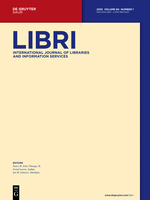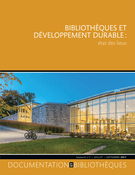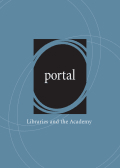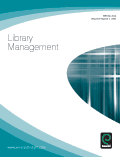
LIBRARY JOURNAL
Scope & Guideline
Transforming Information Landscapes Together
Introduction
Aims and Scopes
- Health Information Literacy and Accessibility:
The journal emphasizes the importance of health literacy, exploring how libraries can enhance the accessibility of health information to diverse populations, including marginalized communities, and how this affects health outcomes. - Technology Integration in Health Libraries:
A consistent focus is placed on how technological advancements impact health library services, including the use of big data, AI tools, and digital health interventions to improve service delivery and information retrieval. - Community Engagement and Needs Assessment:
Research often highlights the role of libraries in conducting community health needs assessments, ensuring that information services align with the specific needs of local populations. - Evidence-Based Practice and Research Support:
The journal supports the development of evidence-based practices among health professionals, emphasizing the role of librarians in supporting research through effective information retrieval and dissemination. - Professional Development and Training:
There is a focus on the training needs of health librarians and information professionals, addressing gaps in skills and knowledge necessary to adapt to the changing landscape of health information.
Trending and Emerging
- Impact of COVID-19 on Health Information Behaviors:
The pandemic has catalyzed a surge in research exploring how COVID-19 has influenced health information-seeking behaviors, access to information, and the role of libraries in supporting public health. - Utilization of Artificial Intelligence and Big Data:
Emerging themes include the application of AI and big data analytics in health librarianship, indicating a trend toward leveraging technology to enhance information retrieval and user experience. - Collaboration and Interprofessional Practices:
There is an increasing emphasis on collaborative practices between health librarians and other health professionals, particularly in promoting evidence-based practices and health literacy initiatives. - Health Literacy as a Central Theme:
Health literacy continues to gain traction as a critical area of focus, with research dedicated to understanding and improving health literacy among various demographics, especially during health crises. - Digital Health Innovations:
The journal is increasingly publishing on digital health innovations, including telehealth and mobile health applications, reflecting the growing intersection of technology and health information services.
Declining or Waning
- Traditional Print Resources:
The focus on print materials has decreased as libraries increasingly shift towards digital resources and e-books, reflecting a broader trend in information consumption. - General Health Information Without Context:
There seems to be a decline in publications focusing on general health information dissemination without contextual understanding of specific community needs or technological implications. - Historical Perspectives on Library Services:
The journal has shifted away from historical analyses of library services, with less emphasis on retrospective studies and more focus on current practices and future directions. - Narrowly Defined User Groups:
Research centered on very specific user groups or niche populations appears to be waning, as the journal increasingly prioritizes broader community engagement and health disparities.
Similar Journals

LIBRI-International Journal of Libraries and Information Studies
Connecting Researchers and Professionals in Library ScienceLIBRI - International Journal of Libraries and Information Studies, with ISSN 0024-2667 and E-ISSN 1865-8423, is a premier academic publication in the field of library and information science. Published by the esteemed Walter de Gruyter GmbH in Berlin, Germany, this journal has carved a distinguished place in academic discourse, earning a Q2 ranking in 2023 within its category, which underscores its impact and relevance to the community. With a comprehensive history spanning from 1950 and ongoing coverage until 2024, LIBRI provides a platform for rigorous research and innovative studies that advance the understanding of libraries and information systems globally. Researchers, professionals, and students are invited to engage with its diverse articles that cover a plethora of topics relevant to today’s information landscape. Although not an open-access journal, its contributions are valuable for those seeking to enhance their knowledge and stay updated in a rapidly evolving field.

Documentation et Bibliotheques
Navigating the complexities of documentation and libraries.Documentation et Bibliothèques is a pivotal academic journal published by the Association pour l'Avancement des Sciences et Techniques de la Documentation, based in Montreal, Canada. Focusing on the fields of library science and documentation, this journal serves as a crucial platform for disseminating research and practical insights that drive innovation in information management and library services. Although it does not follow an open access model, it boasts a dedicated readership among researchers, professionals, and students who seek high-quality content in the realm of information science. With its commitment to advancing theoretical and empirical studies, Documentation et Bibliothèques remains an essential resource for navigating the evolving landscape of documentation and library services. For those interested in exploring how strategic documentation practices can enhance knowledge dissemination, this journal provides a wealth of valuable resources and scholarly articles.

South African Journal of Libraries and Information Science
Empowering information professionals through open dialogue.South African Journal of Libraries and Information Science, published by FORUM PRESS, is a premier open-access journal dedicated to advancing knowledge and research in the realms of library science and information management. Since its inception, this journal has been pivotal in promoting scholarly discourse amongst librarians, information professionals, and researchers within South Africa and beyond. With its open-access model implemented in 2011, it provides an invaluable platform for the dissemination of research findings, encouraging accessibility and collaboration within the field. The journal features a diverse range of articles that explore contemporary issues, innovations, and best practices in libraries and information science, making it essential reading for those seeking to stay at the forefront of this dynamic discipline. By fostering open dialogue and knowledge sharing, the South African Journal of Libraries and Information Science plays a critical role in shaping the future of library and information science education and practice.

PORTAL-LIBRARIES AND THE ACADEMY
Bridging Gaps Between Information Access and Higher LearningPORTAL: Libraries and the Academy is an esteemed academic journal published by Johns Hopkins University Press, focusing on the intersection of library and information science, academic practice, and scholarly communication. With an ISSN of 1531-2542 and an E-ISSN of 1530-7131, this journal offers rigorous peer-reviewed research essential for librarians, researchers, and information professionals committed to enhancing academic libraries and fostering innovative practices in higher education. It holds a strong position in its field, ranking in the 61st percentile within Social Sciences and Library and Information Sciences, and categorized as Q2 in both Development and Library and Information Sciences for 2023. Though the journal is not Open Access, its content is invaluable for anyone interested in staying abreast of the latest trends and challenges in library services and academic environments. Since its inception in 2001, PORTAL has continuously contributed to the discourse on the evolving role of libraries in academia, making it a critical resource for those striving to bridge the gap between information access and higher education pedagogy.

AIB Studi
Elevating the role of libraries in society.AIB Studi is a vital peer-reviewed journal published by the ASSOC ITALIANA BIBLIOTECHE-AIB, focusing on the dynamic field of Library and Information Sciences. Since its inception in 2012, the journal has embraced an Open Access model, ensuring that research is accessible to a global audience without financial barriers. Based in Italy, AIB Studi promotes scholarly discourse and innovative practices in the library sector. With an emerging reputation reflected in its 2023 Quartile Rank of Q3 in Library and Information Sciences and a current Scopus ranking of #210/280, it serves as an essential resource for professionals, researchers, and students seeking to advance their knowledge and contributions to the field. The journal publishes articles that delve into the evolving role of libraries in society, explore technological advancements, and examine information management strategies, fostering an environment of collaboration and progressive development in library sciences.

Library Management
Fostering Scholarly Discourse in Library and Information SciencesLibrary Management, published by Emerald Group Publishing Ltd, is an esteemed academic journal dedicated to the field of Library and Information Sciences. Since its inception in 1979, the journal has continued to be a vital resource for researchers, scholars, and practitioners interested in the evolving practices of library management, information organization, and the role of libraries in the digital age. With an impressive Q1 ranking in the Library and Information Sciences category and a strong performance in Scopus metrics (ranked #85 out of 280), Library Management offers innovative insights and evidence-based research that aim to enhance library services and management practices globally. As an essential contributor to the academic and professional landscape, the journal's objectives include promoting scholarly discourse, fostering best practices, and providing a platform for cutting-edge research that addresses current challenges and opportunities in library management. Researchers and professionals in the field can access a wealth of knowledge without open access barriers, ensuring that the latest findings are available to those dedicated to advancing the discipline.

LIBRARY AND INFORMATION SCIENCE
Navigating the future of information sciences together.LIBRARY AND INFORMATION SCIENCE is a specialized academic journal dedicated to the advancement of knowledge and scholarship in the field of library and information sciences. Published by MITA SOC LIBRARY INFORMATION SCIENCE, this esteemed journal has been a crucial platform for scholarly communication since 1980, addressing the dynamic challenges and developments in the information landscape. Although it holds a Q4 category ranking in the Library and Information Sciences according to the 2023 Scopus Ranking, the journal serves a unique niche, providing insights and fostering discussions among a diverse audience of researchers, professionals, and students. With no Open Access options currently available, its valuable research contributions are accessible through institutional subscriptions and library access. The journal aims to disseminate innovative research, case studies, and theoretical explorations that enhance our understanding of information behavior, retrieval systems, library management, and emerging technologies, thus promoting an informed society in an increasingly digital world. Given its focused scope and enduring presence, LIBRARY AND INFORMATION SCIENCE continues to be an essential resource for anyone invested in the future of libraries and information services.

DESIDOC Journal of Library & Information Technology
Empowering Research in Library and Information PracticesDESIDOC Journal of Library & Information Technology, published by the Defence Scientific Information Documentation Centre, is a pivotal scholarly platform in the realm of Library and Information Sciences. The journal, indexed with ISSN 0974-0643 and E-ISSN 0976-4658, has established its reputation with a commendable Q3 category ranking in the latest Scopus quartiles and a notable rank of 113 out of 280 in its field, placing it in the 59th percentile. Engaging a global audience, it disseminates high-quality research insights aimed at advancing the practices and technologies within library and information management. Operating within a converged timeframe from 2012 to 2024, the journal is committed to fostering robust discussions surrounding contemporary issues in the field, making it an invaluable resource for researchers, professionals, and students alike. While currently not offering open access, its content is accessible through institutional subscriptions, reinforcing its significance in the academic community of India and beyond.

Biblios-Revista de Bibliotecologia y Ciencias de la Informacion
Fostering Engagement in Library Science DiscourseBiblios-Revista de Bibliotecologia y Ciencias de la Informacion, published by the University of Pittsburgh's Library System, stands as a pivotal contributor to the field of Library and Information Sciences. Holding an ISSN of 1562-4730, this peer-reviewed journal has been offering Open Access content since 2011, reinforcing its commitment to the democratization of knowledge. Despite its current classification in the Q4 quartile with a Scopus rank of 257 out of 280 in its category, the journal plays a crucial role in disseminating research that explores contemporary challenges and innovations within the library science landscape. It is particularly relevant for researchers, practitioners, and students invested in the future of information management and bibliographic studies. With coverage from 2014 to 2024, Biblios provides a platform for scholars to engage with critical discourse, share findings, and enhance the global library and information community.

Aslib Journal of Information Management
Fostering Open Access to Transformative KnowledgeThe Aslib Journal of Information Management, published by Emerald Group Publishing Ltd, stands as a vital resource within the field of library and information sciences, enjoying a prominent position in the academic landscape with an impressive 2023 impact factor. This journal embraces a wide-ranging scope that encompasses innovative research, practical applications, and theoretical advancements in information management. Reflecting its exceptional quality, it has achieved a Q2 ranking in Information Systems and a distinguished Q1 ranking in Library and Information Sciences as of 2023. With its Scopus rankings placing it in the 83rd percentile for Library and Information Sciences, the journal is a leading platform for both scholars and practitioners seeking to advance knowledge in the discipline. The journal is committed to open access, fostering greater visibility and accessibility of research outputs. As it converges on its tenth anniversary (2014-2024), the Aslib Journal of Information Management continues to be an essential tool for researchers, professionals, and students eager to navigate the rapidly evolving landscape of information management.